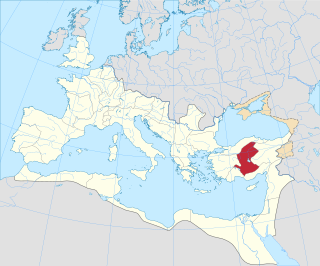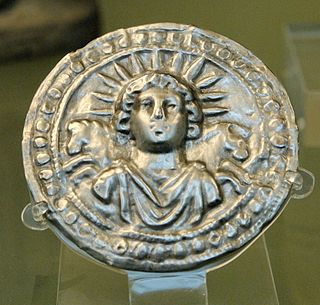
The Tectosages or Tectosagii (Gaulish: *Textosagioi, 'Dwelling-Seekers', or 'Possessions-Seekers') were one of the three ancient Gallic tribes of Galatia in central Asia Minor, together with the Tolistobogii and Trocmii. [1]

The Tectosages or Tectosagii (Gaulish: *Textosagioi, 'Dwelling-Seekers', or 'Possessions-Seekers') were one of the three ancient Gallic tribes of Galatia in central Asia Minor, together with the Tolistobogii and Trocmii. [1]
The ethnonym Tectosagii is a latinized form of Gaulish *Textosagioi (sing.Textosagios), where the voiceless velar fricative ⟨x⟩, unknown in Latin, was replaced with the sound ⟨k⟩. [2] It can be translated as 'those who seek a dwelling', or 'those who seek possessions', from the Celtic stem *texto- ('goods, property, possessions'; cf. Old Irish techt 'possession') attached to sagi- ('who is seeking'). The name can be compared with the Old Irish legal term techtaigidir, meaning 'to seek to establish (or reestablish) legal claim to land'. [2] [3]
According to Strabo, the Tectosages came originally from the region around Tolosa in Gaul, where they had been part of the tribal confederation of the Volcae. During the Gallic invasion of the Balkans, c. 280 BC, a branch of the Volcae Tectosages, returning from Delphi, split from the main group and joined two other tribes, the Tolistobogii and the Trocmi. Around 278 BC, they were hired as mercenaries by Nicomedes I of Bithynia and crossed the Bosporus.[ citation needed ] After leaving Bithynia, they raided in Asia Minor and finally settled in eastern Phrygia, where they established a new Celtic confederate identity as the Galatians.[ citation needed ] The Tectosages occupied the centre of the Galatian territory, round their capital Ancyra, with the Tolistobogii in the west and the Trocmii to the east.[ citation needed ]
Caturix was the war god of the Helvetii.

Galatian is an extinct Celtic language once spoken by the Galatians in Galatia, in central Anatolia, from the 3rd century BC up to at least the 4th century AD. Some sources suggest that it was still spoken in the 6th century. Galatian was contemporary with, and closely related to, Gaulish.

The Lingones were a Gallic tribe of the Iron Age and Roman periods. They dwelled in the region surrounding the present-day city of Langres, between the provinces of Gallia Lugdunensis and Gallia Belgica.

The Carnutes or Carnuti, were a Gallic tribe dwelling in an extensive territory between the Sequana (Seine) and the Liger (Loire) rivers during the Iron Age and the Roman period.
The Volcae were a Gallic tribal confederation constituted before the raid of combined Gauls that invaded Macedonia c. 270 BC and fought the assembled Greeks at the Battle of Thermopylae in 279 BC. Tribes known by the name Volcae were found simultaneously in southern Gaul, Moravia, the Ebro valley of the Iberian Peninsula, and Galatia in Anatolia. The Volcae appear to have been part of the late La Tène material culture, and a Celtic identity has been attributed to the Volcae, based on mentions in Greek and Latin sources as well as onomastic evidence. Driven by highly mobile groups operating outside the tribal system and comprising diverse elements, the Volcae were one of the new ethnic entities formed during the Celtic military expansion at the beginning of the 3rd century BC. Collecting in the famous excursion into the Balkans, ostensibly, from the Greek point of view, to raid Delphi, a branch of the Volcae split from the main group on the way into the Balkans and joined two other tribes, the Tolistobogii and the Trocmi, to settle in central Anatolia and establish a new identity as the Galatians.

The Senones or Senonii were an ancient Gallic tribe dwelling in the Seine basin, around present-day Sens, during the Iron Age and the Roman period.
The Mandubii were a small Gallic tribe dwelling near their chief town Alesia, in modern Côte-d'Or, during the Iron Age and the Roman period.

The Petrocorii were a Gallic tribe dwelling in the present-day Périgord region, between the Dordogne and Vézère rivers, during the Iron Age and the Roman period.
The Caletes or Caleti were a Belgic or Gallic tribe dwelling in Pays de Caux, in present-day Normandy, during the Iron Age and the Roman period.

The Lemovīcēs were a Gallic tribe dwelling in the modern Limousin region during the Iron Age and the Roman period.

The Aulerci were a group of Gallic peoples dwelling in the modern region of Normandy, between the Loire (Liger) and the Seine (Sequana) rivers, during the Iron Age and the Roman period. They were divided into the Cenomani, the most powerful of them, the Eburovices, the Diablintes, and the Brannovices. The relationship that linked them together remains uncertain. According to historian Venceslas Kruta, they could have been pagi that got separated from a larger ethnic group of the pre-Roman period.

The Ambarri were a Gallic people dwelling in the modern Ain department during the Iron Age and the Roman period.

Tolistobogii is the name used by the Roman historian, Livy, for one of the three ancient Gallic tribes of Galatia in central Asia Minor, together with the Trocmi and Tectosages. The tribe entered Anatolia in 279 BC as a contingent of Celtic raiders from the Danube region, and settled in those regions of Phrygia which would later become part of the Roman province of Galatia. The Galatians retained their Celtic language through the 4th century AD, when Saint Jerome mentions that the Galatians still spoke a Celtic language in his times.
The Latobici or Latovici were a Celtic tribe dwelling in Pannonia Superior, around present-day Drnovo (Slovenia), during the Roman period.

The Bituriges Vivisci were a Gallic tribe dwelling near modern-day Bordeaux during the Roman period. They had a homonym tribe, the Bituriges Cubi in the Berry region, which could indicate a common origin, although there is no direct of evidence of this.

The Gauls were a group of Celtic peoples of mainland Europe in the Iron Age and the Roman period. Their homeland was known as Gaul (Gallia). They spoke Gaulish, a continental Celtic language.

The Cadurci were a Gallic tribe dwelling in the later region of Quercy during the Iron Age and the Roman period.

The Nitiobroges were a Gallic tribe dwelling on the middle Garonne river, around their chief town Aginnon, during Iron Age and the Roman period.
The Arecomici or Volcae Arecomici were a Gallic tribe dwelling between the Rhône and the Hérault rivers, around present-day Nîmes, during the Iron Age and the Roman period.
Xavier Delamarre is a French linguist, lexicographer, and former diplomat. He is regarded as one of the world's foremost authorities on the Gaulish language.